
Biotechnia Ellinikon Trikyklon, or BET, was a small vehicle manufacturer founded in Athens by Petros Konstantinou. It was one of several manufacturers - the first appearing in the early 1940s - that converted BMW or other motorcycles into light utility three-wheelers. In 1965 it entirely designed and built a small five-seat passenger car with a BMW 125cc motorcycle engine. Although the type was certified, only one was built due to problems in availability of parts for further production. Following this design, three-wheeled truck models were developed and produced. A second passenger car model was designed and introduced in 1973, known as model 500, with a Fiat 500cc engine. With metal body, seating up to five passengers and featuring very good road handling, it was a rather advanced three-wheeler for its time. It was certified for production and 15 were built, of which one survives to this date in excellent condition. There were even talks with a South African company involving plans for exports or even transfer of production to that country, but they were never realized. The company ceased production in 1975.
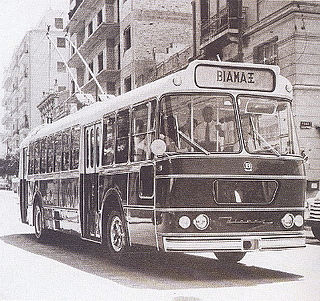
BIAMAX(Proper Greek pronunciation Viamax) was a Greek vehicle manufacturer. In the late 70's it was one of the biggest Greek companies, operating three factories and several other auxiliary facilities throughout the country. In addition, BIAMAX became a leading industry in Greece, in areas including Quality Assurance, technical training, process documentation and Research & Development. Although its main activity was vehicle manufacture, some of its subsidiaries were also involved in areas like tourist services, exports of farm products and shipping.

Petropoulos is today a major importer and distributor of vehicles and heavy machinery, having been, at the same time, one of the "historic" Greek engine and vehicle manufacturers.

Saracakis Brothers group of companies is a major Greek Commercial and Industrial group, for two decades a traditional competitor to Biamax. Two of the most talented Greek vehicle engineers who had worked for Biamax, A. Rizos and I. Dracoulis also worked for Saracakis, Dracoulis having designed the company's characteristic, recognizable 'Σ' logo.

STYL KAR was named after its founder, the engineer Stylianos Karakatsanis. Its entire history is representative of a large number of Greek companies who were engaged in the construction of simple utility vehicles.

Alta was a Greek manufacturer of light and heavier three-wheeler trucks, motorcycles and passenger cars. Production of motorcycles and three-wheeler trucks with Sachs 50cc engines started in its first factory in Athens in 1962. The 50S motorcycle model was known for its reliability. In 1967 it designed and developed model A700, a heavier three-wheel truck with 2-cylinder BMW 35 hp engine and a payload of 800 kg. The truck, featuring a pleasant design and high reliability became one of the most successful vehicles of its kind in Greece. In 1968 Alta introduced a three-wheel passenger car, model A200. Powered by a Heinkel 200cc engine, the car was based on the German Fuldamobil, but with Alta's own body design. The company moved production to a new, larger factory in Elefsis where it operated until 1978.

DIM Motor Company, a Greek automobile maker, was created by Georgios Dimitriadis as a successor to his earlier company, Bioplastic S.A., which had produced the Attica automobile. The DIM represented one more effort by Mr. Dimitriadis to design and develop a modern car entirely by his company's own means. A 400cc, air-cooled, 2-cylinder, 30-hp engine was also developed in-house to power the vehicle, but due to delays in the engine development, the car was introduced with a 600cc engine and other mechanical parts of the Fiat 126 model. A 650cc Fiat engine was also used, in an improved version. The car was finally introduced at the Geneva Motor Show in 1977, and for this reason received more publicity than most Greek vehicles, appearing in many international publications. All development work had been made in a factory intended for its production in Acharnes, while the company was advertised in the Greek press; plans were also made for more versions, including a sports coupe. However, the costs involved and the car's poor prospects in the Greek market resulted in termination of production after only about ten had been produced. The whole project was abandoned in 1982, having been Georgios Dimitriadis' last venture in the automotive industry.
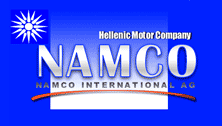
NAMCO is a Greek vehicle manufacturer. It was founded in 1972 by brothers Petros Tzannetos Kontogouris and Rodolfos Kontogouris.
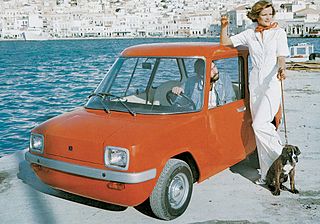
Neorion is one of the oldest Greek heavy industries, located in Ermoupolis, on the Greek island of Syros. Today, it is one of the few remaining major industrial corporations in what used to be the industrial and commercial center of Greece, before being eclipsed by Piraeus in the late 19th century.
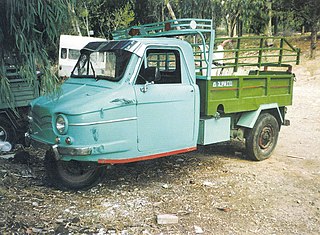
Pan-Car was a Greek producer of automobiles and light trucks, operating between 1968 and 1994. As was often the case in Greece, its name comes from that of its founder, Panayiotis Caravisopoulos. In 1968 it was one of many Greek companies that produced three-wheeler trucks, using Volkswagen engines. In 1977 it introduced beach buggy models built on Volkswagen chassis, which were produced for several years. In 1992 it introduced a jeep-type automobile, also with Volkswagen mechanicals. The model faced a problem common to such ventures in Greece, i.e., receiving type certification for production. That, and financial problems forced the company to go out of business in 1994.

Malkotsis is the trade name for Technica S. Malkotsis A.E., which has historically been the most important Greek engine manufacturer, surpassing several engine manufacturers that flourished in Greece in the 1920s and (mostly) 1930s, like Dimadis-Kanakis in Volos, Peteinaris in Kalamata, Sideris, BIO, and others in Athens, etc. Located in Piraeus, before World War II Malkotsis produced various types of industrial machinery. After the war it produced industrial machinery for several Greek companies, but it progressively focused almost entirely on diesel engines, soon becoming the largest company in its field. Malkotsis engines found use in a variety of industrial applications, while its boat engine models became legendary for their reliability. A series of electric motors was produced as well. Its EM Diesel series included engines specifically designed for powering of vehicles and was employed in Malkotsis's own farm tractor models introduced in 1959. The tractors were produced for only a few years, due to lack of funding and other problems related to a complete lack of state support. The company faced financial problems later, due to competition from cheaper imports, and was acquired in 1991 by Drakos-Polemis A.E., a pump manufacturing company which used all Malkotsis infrastructure for its production purposes.
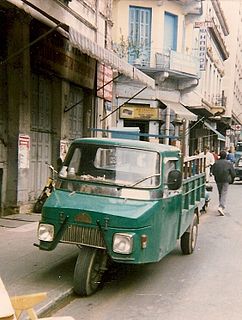
Ros was the trade name of vehicles produced by the Greek company 'Stavros Konstantinides O.E.', based in Athens. The Ros three-wheeler trucks were the most successful of its kind in Greece, having been produced by the thousands. Ros surpassed in sales even "Greek classics" like Alta and Styl Kar, and the characteristic shape of its trucks could be seen for several years in every corner of the country. And for good reason: The 'Rosaki' was one of the most robust and reliable vehicles ever used in Greece. In 2006, 30 years after the end of three-wheeler production, several Ros were still in use in excellent condition, more than any other three-wheeler type.

AutoDiana was a Greek truck manufacturer based in Thessaloniki, in operation between 1975 and 1984. Its main product was the 'Unicar' model, a rather heavy-looking 4x4 multi-purpose truck. This robust vehicle had a payload of 1500 kg and used Mercedes-Benz Diesel engine and Dodge axles. Its fate, along with similar Greek multi-purpose trucks like the Petropoulos Unitrak, the Agricola, the Motoemil Autofarma, the Balkania Autotractor, the Namco Agricar and others, was sealed when a change of Greek law in 1984 modified tax treatment for such 'farm' vehicles. Production was terminated the same year ending a "career" of decent sales among customers in the Greek countryside.

Scavas is the name of sports cars designed by Greek engineer Vassilios Scavas that were never industrially produced.
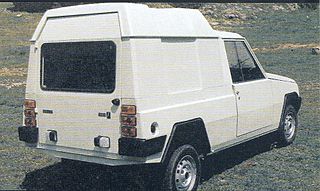
MAVA Company was the Greek importer of Renault automobiles. In 1979, it decided to enter the car-production business introducing a passenger-utility car, a type then very popular in Greece for tax cetagorization reasons. MAVA assigned the creation of the car to Georgios Michael, a Greek designer credited with the design of Neorion Chicago, as well as that of several other Greek vehicles. Michael and his team completed the development and prototype construction in record-time and the car, named Farma, was introduced the same year. MAVA had insisted that the car should be presented as a "Renault model" and thus the prototype was tested and approved by the French company. The Farma, accordingly bearing the Renault logo, was produced in a variety of versions, including "passenger" and "van" types. It had a 4-cylinder 845 cc 34 hp (25 kW) engine and could reach a top speed of about 110 km/h (68 mph). A total of 4500 were built, including the "pure jeep-type" Σ model introduced in 1983, and some minor face-lifts. The attractive car had also received a modest publicity in the European press. By 1985, the Greek law had changed affecting the market for this type of vehicles, thus making their production unprofitable. Michael and his team then worked on a new model; the much more advanced new Farma Change was introduced in 1985. By that time, though, MAVA had scrapped the whole project and only one car, the prototype of the new model, was built.
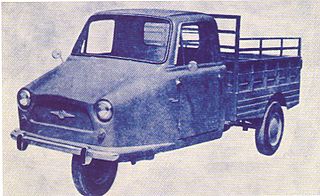
Motoemil was a Greek truck manufacturer based in Thessaloniki. It was named after Emilios Antoniades who started his business, together with his brother Konstantinos, by constructing crude-made trucks assembled from motorcycle and automobile parts. By the mid-1960s, like other similar Greek manufacturers, they were already developing and building complete "automobile" three-wheeler trucks. Motoemil was one of the first of its kind in Northern Greece and soon became the largest in that region, its products sold throughout the country. The first models used 1200cc Volkswagen air-cooled engines. A completely redesigned, more modern-looking model was introduced in 1970, using a German Ford engine.

Emporiki Autokiniton was a major Greek automobile trading and industrial company. Systematic vehicle production started in 1968, while the company built a modern vehicle assembly factory in the north of Athens in 1971. A large number of Mazda, Opel and, later, Alfa Romeo models were assembled – usually with a significant proportion of parts locally produced. The company also introduced modified versions of Mazda trucks, including longer versions of the B1500 and B1600 light trucks. A number of the latter was also produced with the company’s own Grezda brand name in the early 1980s, mostly for export. Emporiki Autokiniton was seriously affected by problems largely connected with the labor unrest of the 1980s in Greece and production was eventually terminated in 1985, after a failed attempt to produce a jeep and a 2-tonne truck type of own development.

TEMAX is today the leading Greek manufacturer of fire-fighting vehicles, while under its previous name, Tangalakis, it has been one of the most historic bus manufacturers in that country.

Tropical is a Greek manufacturer involved in machinery and vehicle development and production. Its history is characteristic of a company which has made significant efforts to evolve in a country that effectively forbids production of locally developed passenger cars.
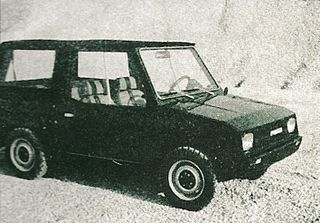
Autokinitoviomihania Ellados was founded in Athens in 1975 by a group of Greek businessmen, including the owners of the company importing Fiat in Greece.
























